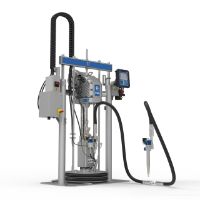Automotive Seam Sealing
What is Seam Sealing?
Seam sealing is the process of applying ambient and warm-applied sealants to the car body. This application protects the exterior from damage and corrosion while also keeping dirt, dust and water on the vehicle’s the upper body, interior and exterior.
The Seam Sealing Process
The optimised seam sealing process happens in the paint shop. First, sealants are sprayed or dispensed on seams or along flanges. Then, to strengthen the seal and withstand subsequent operations, they are either:
- Cured to form a waterproof seal
- Baked to form an adherent seam seal
After the vehicle assembly, most interior seam seals are not visible because they are typically covered by carpet flooring, roofing details, or additional accessories (enhancements). As for the exterior, seam seals are covered in the paint shop.
Material Dispensing
Polyvinyl chloride (PVC), epoxies and expanding sealants are typically used in seam sealing applications. The application methods of these materials include either a swirl or bead application. Consistent and clean dispenses are necessary during the dispensing process to maintain efficiency and optimise adhesive utilisation.
Challenges of Seam Sealing
Challenges can arise when performing this application if dispenses are not consistent or cycle time is slow; This can result in a weak or ineffective seal, compromising the durability and long-term protection of your car’s exterior and interior. Additionally, achieving a clean dispense contributes to the overall look and quality of the seam seal, so it is essential to avoid a quick or messy application.

Summary
Effectively seam sealing is crucial to protect a car’s interior and exterior from complications or leaks. Graco offers a range of automated dispensing systems for seam sealing processes. Our products offer tight and clean dispense, with an efficient process and optimal dispensing speed. See our configurations below that can support whatever size of material delivery containers you may have.








